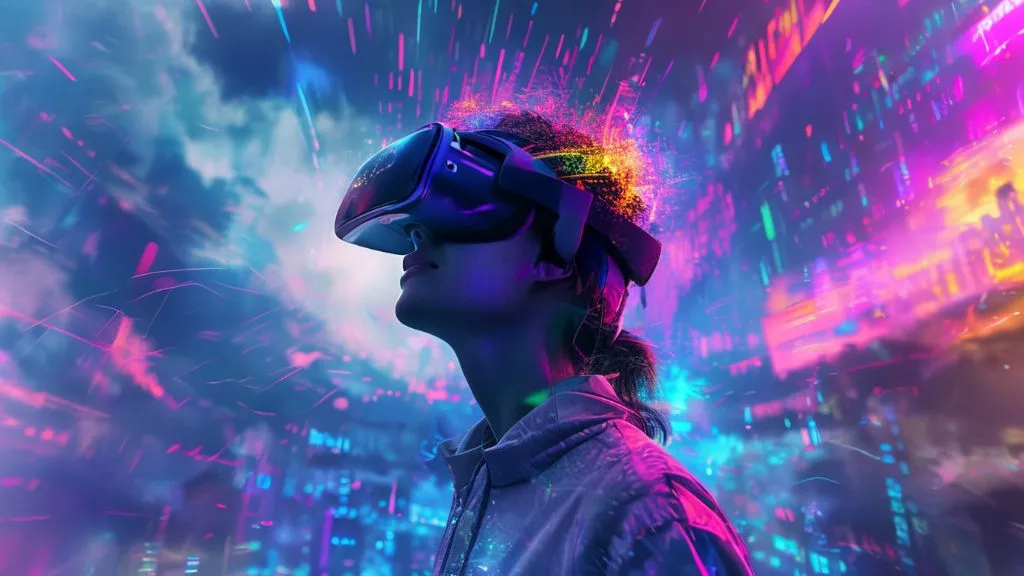The early 2020s saw the meteoric rise of the term “metaverse,” capturing global attention with the promise of a new digital frontier. However, initial enthusiasm waned due to a lack of compelling content and technological limitations, leading some to question its longevity.
Yet, the metaverse is experiencing a remarkable resurgence, fueled by the powerful capabilities of Artificial Intelligence (AI). Like a hero in a story, AI is addressing the metaverse’s inherent challenges and unlocking new possibilities. Building upon past lessons, the integration of AI promises more realistic and immersive digital experiences. The advancements in AI technology have the potential to transform the metaverse from a mere virtual space into a catalyst for innovation across our daily lives and various industries.

Can AI Be the Savior of the Metaverse?
AI is emerging as a pivotal technology in overcoming the hurdles faced by the metaverse. Natural Language Processing (NLP), in particular, is poised to revolutionize user interaction within these virtual environments. AI-powered chatbots and virtual assistants can understand user queries naturally, discern emotions and intentions, and provide tailored information, leading to richer and more engaging user experiences. Imagine a personal AI assistant that understands your needs and offers relevant support, making your activities within the metaverse seamless and enjoyable.
Generative AI is also spearheading a revolution in metaverse content creation. Its ability to generate diverse content formats in real-time – including text, voice, images, and 3D models – dramatically simplifies the content creation process, which traditionally required specialized skills, time, and significant costs. With AI assistance, users can create personalized avatars, bring their imagined spaces to life, and develop entirely new forms of digital content to share. This will enrich the metaverse ecosystem, fostering greater user participation and immersion.
Global Tech Giants Investing in the AI-Powered Metaverse
Leading global technology companies are actively merging AI and Extended Reality (XR) technologies to build the next generation of metaverse platforms.
Apple launched its ‘Vision Pro’ in the US in February 2024, a device based on spatial computing technology. Spatial computing overlays digital content onto the real world, and its core functionality lies in leveraging AI to understand the user’s context in real-time and facilitate natural communication. Apple aims to create new user experiences by seamlessly blending digital content with physical spaces.
Meta is also heavily invested, aiming to release its ‘Hypernova’ smart glasses later this year. These glasses will support natural AI-driven interactions. Furthermore, Meta expanded its metaverse platform ‘Horizon Worlds’ to mobile in 2023 and unveiled its new AR glasses, ‘Orion,’ in September 2024, demonstrating its ongoing commitment to the metaverse.
These “bridge devices” are expected to play a crucial role in seamlessly extending metaverse experiences into our daily lives, blurring the lines between the physical and virtual worlds.
The initiatives of tech giants like Apple and Meta signify more than just technological advancements; they hint at a paradigm shift in the future of society. The metaverse, powered by AI, has the potential to become a central platform for various activities, including shopping, work, education, and entertainment, offering increasingly powerful and realistic digital experiences.
The Current State and Challenges of the Korean Metaverse Industry
Unfortunately, South Korea’s metaverse industry is currently perceived to be lagging behind global competition. While Naver’s ‘Zepeto’ once showed strong growth, its momentum has slowed. Many other domestic companies, including Kakao and the three major telecommunication providers, have scaled back or withdrawn from their metaverse ventures. This is largely attributed to a disadvantage in technological capabilities and capital compared to global players, as well as a regulatory environment that is seen as hindering the development of innovative services.
Experts emphasize that for the Korean metaverse industry to rebound, active investment in AI technology and the relaxation of unnecessary regulations are crucial. They also suggest that Korean companies should leverage their strong cultural content, such as K-pop, dramas, and games, by integrating them with the metaverse to secure a differentiated competitive edge in the global market. Exploring Business-to-Business (B2B) market opportunities and developing metaverse platforms specialized for specific industries are also emerging as viable alternatives.
The Future of the Korean Metaverse: Is There Hope?
Despite the current challenges, the integration of AI offers a significant opportunity for the Korean metaverse industry to rebound. The potential applications of AI-powered metaverse platforms are vast, spanning entertainment, healthcare, education, aerospace, and defense. For instance, imagine enjoying immersive K-pop concerts in the metaverse, engaging in personalized learning experiences with AI tutors, or receiving remote medical assistance through expert avatars – all transcending the limitations of the physical world.
To realize this potential, proactive government support and investment are essential. This includes expanding investment in AI technology development, removing unnecessary regulations that impede metaverse innovation, fostering collaboration between academia, industry, and research institutions to cultivate metaverse expertise, and supporting domestic companies in gaining global competitiveness. By leveraging South Korea’s strong cultural assets and AI capabilities, a differentiated metaverse ecosystem can be built, increasing the likelihood of success in the global market.
Ushering in a New Era of Metaverse with AI
In conclusion, the metaverse is not just a passing trend but is re-emerging as a significant platform for the future, empowered by the robust foundation of AI technology. It is poised to overcome past limitations and deliver more realistic and valuable digital experiences.
While the Korean metaverse industry currently faces headwinds, active investment in AI, regulatory reform, and the development of unique content strategies can pave the way for global competitiveness. By staying informed about the advancements and changes in metaverse technology and cultivating the necessary skills for the future, we can all contribute to creating a richer and more innovative metaverse era. Now is a critical time for the Korean metaverse industry to translate its potential into reality and seize the opportunity to lead in the global market.


